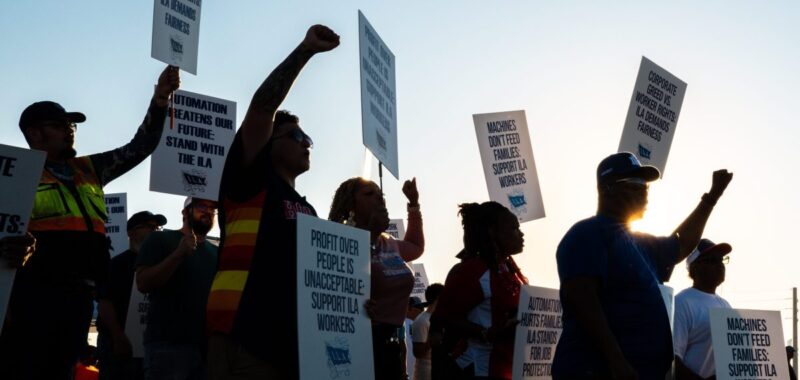
Good morning.
Events this week highlight the vivid contrast in attitudes around the potential of AI. Yesterday, OpenAI raised $6.6 billion from investors like Microsoft, Thrive Capital, and SoftBank. That gave the startup behind ChatGPT a $157 billion valuation and gave the market a clear indication of the excitement among those in the know. A day earlier, 45,000 dockworkers went on strike at 36 U.S. ports, in large part to ward off the threat of automation. One group is doubling down on optimism over AI; the other is fighting it out of fear.
Attitudes can change. Two years ago, OpenAI CEO Sam Altman launched his generative AI chatbot to the public with as much trepidation as excitement. A year later, he was ousted by the OpenAI board, which cited concerns about safety protocols and other issues. He was soon reinstated, and the board was restructured. Now, the company is embarking on its next wave of growth without CTO Mira Murati, who just quit, but Altman is firmly optimistic about the future. In a recent essay, he argued that “in the next couple of decades, we will be able to do things that would have seemed like magic to our grandparents.”
Harold J. Daggett, president and chief negotiator for the International Longshoremen’s Association, sees a decidedly darker future with AI-enabled automation. In this interview posted by the union, he says, “I’m against automation.” Indeed, he’s spoken out against the loss of toll-booth workers because of E-ZPass, an innovation that many drivers applaud. While Daggett is arguing that dockworkers are going to win in blocking automation, it’s hard to not think of other industries disrupted by technology and disagree. What they might do is spur more training and partnership to help workers adapt to new technologies.
In these early days for AI, many companies are struggling to figure out the best places to invest and test new technologies. CEOs report that they’re seeing resistance. These issues and more will be debated at our upcoming Fortune Global Forum in New York on Nov. 11 and 12. If you would like to apply to attend, click on this registration link.
More news below.
Diane Brady
diane.brady@fortune.com
Follow on LinkedIn
TOP NEWS
Philips’ expanding C-suite
Philips CEO Roy Jakobs is expanding his C-suite to help the Dutch medical device maker move past a 2021 recall of breathing machines that nearly decimated the company. Creating the job of chief patient safety and quality officer “is as much of a practical thing as it is a message to everybody in the company” that safety is a priority, Jakobs says. Fortune
Nike shares drop
Nike shares dipped nearly 5% on Wednesday after the sneaker company postponed its investor day and repealed its full-year guidance during an earnings call. The company’s stock had rallied following the announcement of a new CEO last month. Fortune
The ‘power hour’ starts now
Affluent professionals are ditching traditional happy hours and are instead opting for faster—and fancier—’power hours.’ These hours often start before the work day is over and attract high-status networkers. Fortune

